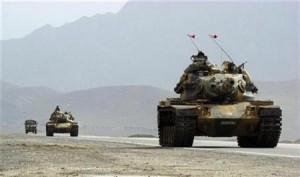Special to WorldTribune.com
NICOSIA — Syria’s Kurdish community, more than 15 months into the
Sunni revolt, has refused to join the campaign to oust President Bashar
Assad.
Western diplomatic sources said the Kurdish community of more than two
million have chosen to stay on the sidelines in the revolt against Assad.

The sources said that despite generous cash offers only a small percentage of young Kurds have joined the Sunni rebels.
“The Kurds are providing marginal support, but they are focusing in
protecting their areas and interests,” a diplomat said.
The sources said the Assad regime has appeared to retain greater
influence among Kurds than the Sunni opposition. They said thousands of Kurds have remained in the Syrian military and many of them were also being recruited into Assad’s Shabiha militia, which targets civilians. Others have fled to the autonomous region of Kurdistan in northern Iraq.
The Kurdish loyalty to Assad has been regarded as crucial to foil rebel
plans to carve out a buffer zone along the border with Turkey. The sources
said the rebels, led by the Free Syrian Army, appear to have gained
unprecedented freedom of operation in northeastern Syria, particularly in
the province of Idlib.
But the Kurdish leadership has not allowed the rebels to ignite
Kurdish-populated towns near the Turkish border, including Qamishli. The
sources said Kurdish loyalty has been bought by an influx of money and
weapons from Iran, which has sought to revive the Kurdish Workers Party in
Syria.
“The Kurds don’t see this as their fight and feel that a fundamentalist
Sunni regime would be much worse than Assad,” the diplomat said.
Earlier this month, the Muslim Brotherhood-dominated Syrian National Council
elected a Kurd as chairman in an effort to broaden the opposition’s appeal.
But the sources do not expect SNC chairman Abdul Basset Sida, an Arabic
language professor from Sweden, to win significant Kurdish support.
The sources said the Syrian military and security forces have pushed out
many Sunni rebels out of their strongholds in Hama, Homs and Rastan. They
said many of the fighters have moved north toward Idlib in an effort to
benefit from direct Turkish support.
“There is a slow but steady drive to expand rebel operations as more and
more Syrians join the revolt,” a diplomat said. “But right now, it remains
very much a Sunni affair.”
The Free Syrian Army, based in Turkey, has sought to recruit the Kurdish
community in the revolt against Assad. FSA military commander Brig. Gen.
Mustafa Al Sheik warned that Assad was using the Kurds against Turkey.
“The Syrian revolution should encompass all segments of society, and not
limit itself to one social segment at the expense of others,” Al Sheik said.
Mussa Mussa, a Kurdish member of SNC, said Kurds were participating in
the revolt against Assad. But Mussa said Kurdish soldiers were often
deployed far from their homes, which has made it difficult for them to
defect.
“The lack of Kurdish soldiers defecting and joining the FSA in large
numbers is due to the lack of Syrian military battalions in Kurdish areas,”
Mussa said.

You must be logged in to post a comment Login